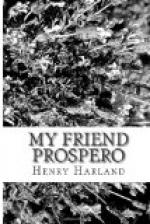Lady Blanchemain softly laughed. “That’s very nice of her, and very wise. Aren’t you going to read your telegram?”
“I didn’t know whether you’d permit,” said John.
“Oh pray,” said she, with a gesture.
The carriage by this time had left the garden, and the coachman had turned his horses’ heads northwards, away from the lake, towards the Alps, where their snowy summits, attenuated by the sun and the distance and the blue air, looked like vapours rising into the sky.
John tore open his envelope, read, frowned, and uttered a half-stifled ejaculation,—something that sounded rather like “I say!” and vaguely like “By Jove!”
“No bad news, I hope?” inquired the lady, sympathetic, and trying to speak as if she didn’t know what curiosity meant.
“Excellent news, on the contrary,” said John, “but a bolt from the blue.” And he offered her the paper.
“Am on my way to Rome,” she read aloud. “Could I come to you for a day? Winthorpe, Hotel Cavour, Milan.”—“Winthorpe?” She pursed her lips, as one tasting something. “I don’t know the name. Who is he? What’s his County?” she demanded,—she, who carried the County Families in her head.
John chuckled. “He hasn’t got a County—he’s only an American,” he said, pronouncing that genial British formula with intention.
“Oh,” sighed Lady Blanchemain, her expectations dashed; and drawing in her skirts, she sank a little deeper into her corner.
“He hasn’t got a County,” repeated John. “But he’s far and away the greatest swell I know.”
“A swell? An American?” Lady Blanchemain pressed down her lips, and gave a movement to her shoulders.
“An aristocrat, a patrician,” said John.
“Fudge!” said Lady Blanchemain. “Americans and Australians—they’re anything you like, but they’re never that.”
John laughed. “I adore,” he said, “our light and airy British way of tarring Americans and Australians with the same brush,—the descendants of transported convicts and the descendants of the Pilgrim Fathers!”
“Is your Winthorpe man a descendant of the Pilgrim Fathers?” asked Lady Blanchemain, dryly.
“Indeed he is,” said John. “He’s descended from ten separate individuals who made the first voyage in the Mayflower. And he holds, by-the-by, intact, the lands that were ceded to his family by the Indians the year after. That ought to recommend him to your Ladyship,—an unbroken tenure of nearly three hundred years.”
“Old acres,” her ladyship admitted, cautiously, “always make for respectability.”
“Besides,” John carelessly threw out, “he’s a baronet.”
Lady Blanchemain sat up. “A baronet?” she said. “An American?”
“Alas, yes,” said John, “a mere American. And one of the earliest creations,—by James the First, no less. His patent dates from 1612. But he doesn’t use the title. He regards it, he pretends, as merged in a higher dignity.”




